Return to Zanarkand
“Listen to my story. This… may be our last chance.”
by Terra_Cide, HSM Editor-in-Chief
It’s almost compulsory for every gamer — and, specifically, every RPG fan — to have a favorite Final Fantasy.
Talk to Jersquall, and he will tell you that Final Fantasy VIII is the definitive game of the series (heck, just look at his name). Ask Jason, and he’d tend to agree, with Final Fantasy VI a close runner up, because let’s face it — how many game villains can you think of who are as successfully diabolical and completely irredeemable as Kefka? Let’s also not forget the countless upon countless others who claim that Final Fantasy VII is the best of the series, because ohmygod that scene with Aerith.
However, for me, it’s Final Fantasy X. Simply put, it’s the game that brought me back to console gaming.
Allow me to tell you my story.
Like any child who grew up in the early to mid 1980s, I was introduced to gaming via the 8-bit glory that was the Atari 2600; after all, who can forget that simulated wood grain? It belonged to one of my very first friends growing up, and it was a nice enough experience, I suppose – playing Ms. Pac-Man, Centipede, Asteroids, Frogger and the like was all well and good. However, it wasn’t exactly what you’d call engaging. It was more like something you did if there was nothing else to do, and reading or going outside (two things I loved doing the most) weren’t an option. Even when the Nintendo/Super Mario Bros. craze swept into my little corner of the world, I remained mainly on the sidelines; I just didn’t see the appeal or why I should care. By then, I had already begun to move into computer-based gaming, and it was giving me what its console-based brethren wasn’t – a reason to play it.
It started in the first grade with a math game that let you custom build a robot by letting the player choose from a selection of parts for a given amount of math problems you solved correctly. I was obsessed with this game; sure, I was already fairly good at math, but mainly I just wanted to see how many different permutations of robot design there were. To this day, I’m still not sure if I found them all.
After that came the obsessions with Where in the World is Carmen Sandiego? and the ubiquitous Oregon Trail. I got a lot more satisfaction from learning about geography and successfully leading a wagon train than I did trying to get some plumber to rescue a perpetually captured princess.
 Then the 90s came, and that’s where I really hit my stride with computer gaming. While my friends were all going giddy over the sight of “blood” in Mortal Kombat on their Super NES, I was playing games like Civilization, Under a Killing Moon, MYST, Titanic: Adventure out of Time, The Last Express, even a PC port of Ninja Gaiden II, and countless others whose names are lost to memory. It’s not that I doubt that there were console games out at the time that provided the same experiences, it’s that, for one, the console games I saw my friends playing weren’t providing them, and two, I had more or less forgotten that consoles existed – yes, even the mighty PlayStation One.
Then the 90s came, and that’s where I really hit my stride with computer gaming. While my friends were all going giddy over the sight of “blood” in Mortal Kombat on their Super NES, I was playing games like Civilization, Under a Killing Moon, MYST, Titanic: Adventure out of Time, The Last Express, even a PC port of Ninja Gaiden II, and countless others whose names are lost to memory. It’s not that I doubt that there were console games out at the time that provided the same experiences, it’s that, for one, the console games I saw my friends playing weren’t providing them, and two, I had more or less forgotten that consoles existed – yes, even the mighty PlayStation One.
Somewhere along the line, I lost contact with gaming altogether. Perhaps it’s that phase everyone goes through as they transition from teenager to adult; that because they are now “an adult,” they now have to put away all traces of the things that would be defined as not being adult. This would make sense, given my upbringing, and so gaming became a part of my life as a memory.
What really happened was the world coming full circle.
It was 2002, perhaps even 2003; I was living with the person who is now my ex, and one afternoon, while I was online paying bills, he turned on the PS2 and started up Final Fantasy X. It had been a while since he last played it, he said, and wanted to see where he left off.
Bear in mind, this wasn’t the first time I had seen him play a PS2 game, though he mainly stuck with Gran Turismo, nor was I unfamiliar with playing on the PS2 myself. One of the first “dates” we had, he had invited me over and we played Burnout and Dead or Alive 2; I even won a few rounds. It had been donkey’s years since I last played a game, any game. But just like the games of the Atari 2600 days, it wasn’t something that gripped me or made me feel like gaming was a hobby to pursue more in-depth, like reading. Then the first few melancholic notes of “To Zanarkand” floated out of the speakers, a real piano, not some MIDI emulation of a piano, and I knew immediately this was something worth paying attention to.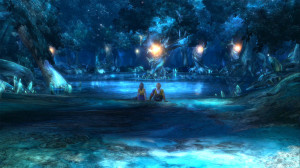
By the time the game’s intro got to the part where you hear James Arnold Taylor, as the voice of Tidus, haltingly utter the quote that prefaces this piece, I realized that this was the game I had been waiting to play my whole life.
If that sounds hyperbolic, trust me, it isn’t.
From the moment I started my first playthrough, Final Fantasy X consumed me as much as I consumed it. I’m pretty sure I was trying to see if it was possible to wear out a disc. Up until that point, all the games I had played, while I thoroughly enjoyed the experiences they offered with the limited technology that was available to create them, they were always missing something. Something that you couldn’t quite define, but essential, to the overall experience. The IT factor, if you will, that made for a complete picture.
To me, Final Fantasy X was that complete moving “word picture”. The upbeat attitude of Tidus – derided by many – contrasted well with the somber tone of the overall story, carried through the game by not just the soundtrack, but by what was alluded to in the character dialogue and emotions. Had his character been more like Cloud’s or Squall’s, there’s little doubt in my mind that players would have entertained the idea of slitting their wrists by the time the party reaches Kilika. Still more people disliked how “Japanese” the game was, and indeed, it does feel more influenced by Japanese culture than any other game in the series. That “argument” (if it can be called that) was always rather eyebrow-arching – after all, Final Fantasy is a JRPG series; having a game heavily influenced by the native culture was bound to happen. There was no definitive “bad guy” which honked off a lot of fans, but think about it, when in life is there ever an individual that is specifically the “bad guy”? At best, the game played fan service to those that needed an antagonist, but the true antagonists weren’t Seymour or Yevon, or even Sin. The true antagonists of Final Fantasy X were loss and despair, and how the disparate elements in the story dealt with them.
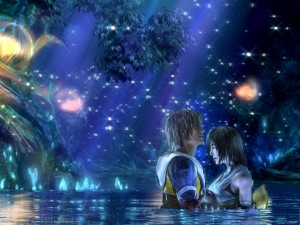 There is plenty of satisfaction to be found in an ending where the good guys win and the hero and heroine ride off into the sunset – believe me, I’ve played/watched/read my fair share of them. But the ending of Final Fantasy X – indeed, the entire theme of the game – demonstrated that while the good guys may win, it’s not without incredible, uncompromising sacrifices. It’s a theme that predates Tolkien (thank god), recalling a much older, more classical style of hero storytelling. To me, that represented a more genuine representation of the human experience; just because you save the world, it’s not a foregone conclusion you’ll also get everything else that’s great and fantastic along with it. Sometimes in order to achieve something great, something bigger than yourself, it means letting go of the things you love and hold closest to your heart. As bittersweet and gut-wrenching as that may feel, especially when it happens in the real world, as a player and observer, it’s more satisfying than an “and they all live happily ever after” ending.
There is plenty of satisfaction to be found in an ending where the good guys win and the hero and heroine ride off into the sunset – believe me, I’ve played/watched/read my fair share of them. But the ending of Final Fantasy X – indeed, the entire theme of the game – demonstrated that while the good guys may win, it’s not without incredible, uncompromising sacrifices. It’s a theme that predates Tolkien (thank god), recalling a much older, more classical style of hero storytelling. To me, that represented a more genuine representation of the human experience; just because you save the world, it’s not a foregone conclusion you’ll also get everything else that’s great and fantastic along with it. Sometimes in order to achieve something great, something bigger than yourself, it means letting go of the things you love and hold closest to your heart. As bittersweet and gut-wrenching as that may feel, especially when it happens in the real world, as a player and observer, it’s more satisfying than an “and they all live happily ever after” ending.
With the introduction of the PS3, I had been waiting for another story and another group of characters to capture my imagination in that same fashion, but nothing quite hit that same mark. Unlike many others, I rather enjoyed the linear feel of Final Fantasy XIII. As a parent, I don’t have time to dedicate weeks and months of my life to hundreds of sidequests, and I’d like to remember what the point of the final battle is by the time I get there. But while some of the character’s stories drew me in and made me think of them after the closing credits rolled, the overall game didn’t grab me in the way I hoped. All other games of the console generation felt too brown, overmuscled, and overwhelmingly male; their storylines too predictable. Journey’s story pulled at me, but I’m willing to admit it probably had more to do with me projecting my own personal experiences into the storyline’s metaphoric feel than the story itself. Even though I have a fairly healthy backlog of PS3 games waiting for me to play them, which also includes PSOne classics like Final Fantasy VII and VIII so I could see what the fuss was all about, I was beginning to feel myself start to pull away from gaming once more.
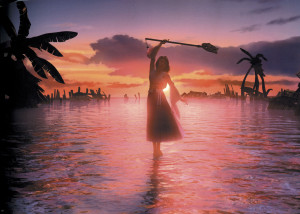
“People die, and Yuna dances. When will she stop dancing? When will it stop? Yuna won’t stop dancing, not until Sin is gone.”
When rumblings of a possible reissue of Final Fantasy X for the PS3 started making themselves known, I followed every tidbit of news I could find. Needless to say, I was overjoyed when this news was confirmed. When the release date was announced last November, I started to mark the days down on my calendar. Now with just about a month to go, I can hardly wait.
Interesting, isn’t it; even though we’re now two console generations removed from the original platform it debuted on, I’m more excited about the remastering of Final Fantasy X than I am about any new releases, for the PS3 or the PS4.
When trying to quantify what makes for a “great” game, the desire to play it through more than once and to have it available across all console generations are significant factors. It’s the same with any sort of experiential entertainment medium. It’s why music and films get remastered; why books are republished and are now accessible in a variety of ways. The material itself mattered to us, made us feel something, and gave us an experience we want to revisit again and again, no matter what the bleeding edge of technology and pop culture may try and tell us what we should be wanting instead.
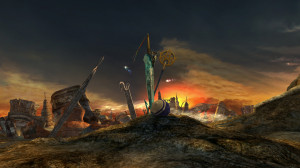
Developers can – and will – continue to wow us with their lifelike graphics and effects, trot out the same story tropes ad nauseum, bring us to the edge of our morality under the pretenses of being “edgy” and pseudo-intellectual, and provide players with more explosions and creative ways to annihilate their enemies all for the sake of the “ding” of a trophy. But unless they provide players with a reason to pick that game up and play it again and again, regardless of how much time has gone by, it will spend more time in the resale section than in anyone’s collection. It will be forgettable. It will never be timeless.
Final Fantasy X is one of those timeless, unforgettable games. Every time I hear those first evocative piano notes, I want to play it. Every time those closing credits roll, I know I’ll be seeing those characters and hearing their voices in my sleep for days to come. Just like a favorite movie or familiar book, I’m looking forward to reliving the experience once again.
Share
| Tweet |


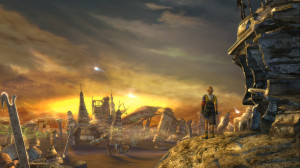
 Twitter
Twitter